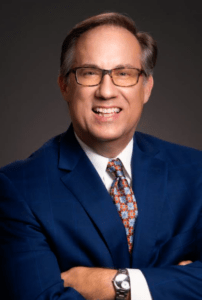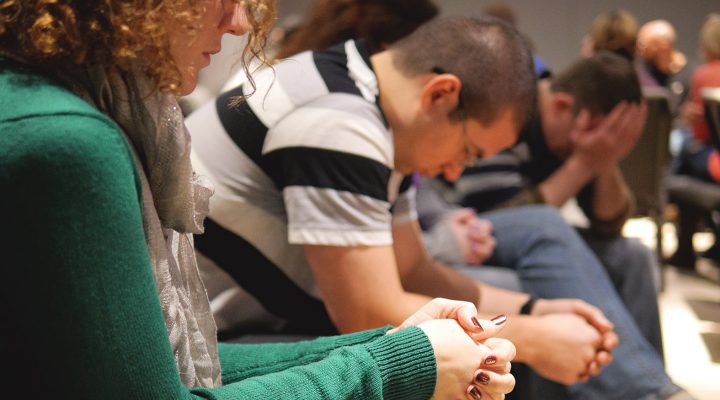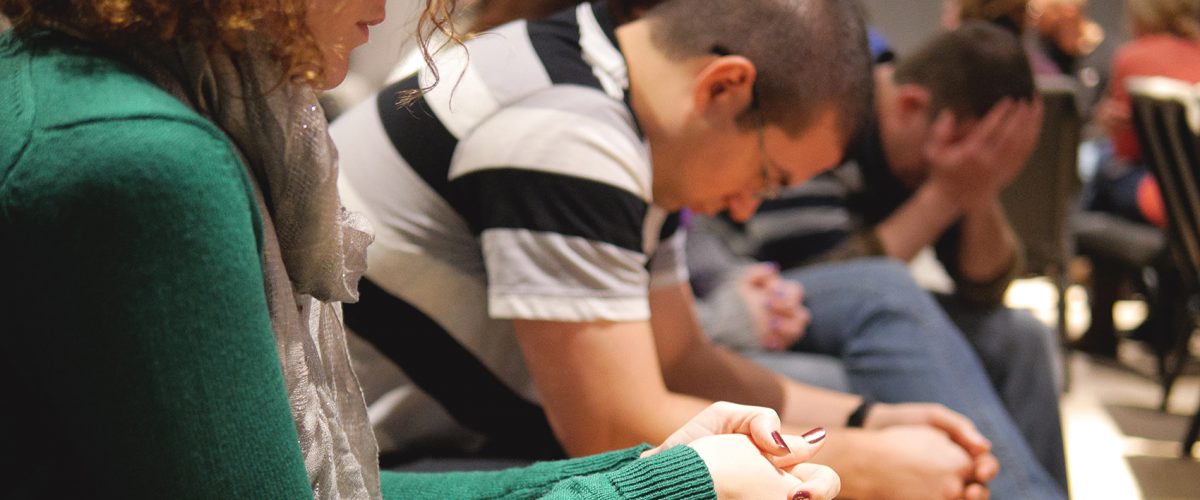Sunday, April 30, was my last Sunday as minister of music at Wilshire Baptist Church in Dallas. That day my colleague, George Mason, senior pastor emeritus, offered Prayers of the People, a regular part of our worship liturgy led by different people each week.
This was a prayer directed to God primarily that also encompassed the concerns of the day: my retirement from Wilshire, prayers for the congregation and more. It was prayer prayed with an understanding that the worship leader offers these words to God on behalf of all those in the room, not merely his or her perspective in the moment.
Every Sunday in every church around the world, worship leaders of all sorts pray in worship.

Doug Haney

Mark Wingfield
Some prayers are extemporaneous, others are written and carefully crafted, and others might be well-prepared but are generally received as spontaneous. We will focus here on written prayers or even those prayers that are well-prepared but delivered more or less from memory.
Why should this matter? While certainly God hears every prayer, the focus here is on what worshipers hear and whether a prayer effectively leads a worshiper to join into the prayer.
This is about prayer and praying in public. This is about prayer that engages the hearts and minds of those seated in the pew. Here they are not merely passive observers of someone speaking to God; here worshipers are included in this sacred act.
Principles of leading prayer in public
Use “we” more than “I.” Offer a thought that shows the one who prays is aware that the gathering of worshipers is praying alongside them. This is not about you; it is about us.
Speak to God more than speaking about God. While there are legitimate prayer practices for individuals and groups that recite Scripture or make declarations about the glory of God, this is not typically the role of corporate prayer in worship. Other elements of worship fulfill this purpose through Scripture readings, litanies and preaching.
Use active verbs. All written and spoken communication sparkles and gains a better hearing when active verbs are used. Example: Pour out your Spirit upon us. Hear our prayers. Comfort those who mourn. Lift up the brokenhearted. Impress upon us your desires.
Be concise. Prayers that ramble lose power. Maybe God still hears, but the congregation will drift off. Know what needs to be said and say it. Nothing more. Even if not reading from a written document, at least have an outline of what you intend to say so you will not lose focus. No single prayer can cover the entire waterfront. Be selective.
“Preaching makes declarations about God or about current events. Most corporate prayers should make intercessions to God on behalf of the people. “
Don’t sneak a preach. One of the greatest offenses committed by those who pray in public is to turn the prayer into a sermon. Preaching makes declarations about God or about current events. Most corporate prayers should make intercessions to God on behalf of the people.
Be relevant. It is the responsibility of the pray-er to bring before God the concerns of the people in that moment, not just in a generic way of “Bless this food to our nourishment and our bodies to your service.” Implore divine intervention in current events and current concerns of the congregation. A public prayer written a week or more in advance will not be relevant.
Be specific. When asking God’s help, give specific examples, such as these: Invade our thoughts, O Lord. Empower us to action. Lift up our broken spirits. Bring healing to these broken bones, these ailing bodies. Open our eyes to see the needs around us today.
Be bold. Scripture admonishes us to “come boldly before the throne of grace.” Leading in corporate prayer affords an opportunity to expand the congregation’s vision that “with God all things are possible. Think big, pray boldly. We have not because we ask not.
Types of prayers
Depending on your congregational context, you may encounter various types of corporate prayers. Here are some common categories and comments on how to address each need.
Invocation. This is a way to call people to worship, to acknowledge we are gathered for worship and to invoke the divine presence. This is not the time for an around-the-world prayer. Invocations are brief, concise and should have a gathering nature. Examples: Open our minds now to hear your word and our eyes to see your salvation. Meet us here, Lord, as we wait to hear anew your word.
Prayers of the People. While congregational norms may vary, Prayers of the People generally encompass the pastoral care needs of the congregation in that moment. While the same prayer may serve other general purposes, it always involves the naming of those with specific needs (respecting confidentiality, of course). This often is a time to call before the Lord the names of those who are ill or grieving or celebrating. This is the heart of communal prayer and intercession.
Prayer of Blessing. Often in the life of a congregation there are special occasions when the gathered body desires to bless someone or something or some project. This may be included in Prayers of the People or may be used as a separate prayer. Some congregations have developed litanies for this purpose or special prayers that are used over and again. The focus of such a prayer should be on thanksgiving to God first, followed by words of gratitude for the gifts of God made known in the person or event being celebrated. It is wise to remember that such prayers of blessing should be rooted in the fact that they are prayers to God, not to the person being blessed.
“The Offertory Prayer is perhaps the hardest of all corporate prayers to do well.”
Offertory Prayer. A staple of older, more traditional worship formats, the Offertory Prayer is perhaps the hardest of all corporate prayers to do well. Examples of trite and perfunctory prayers of this kind are numerous, which might hint at some of the theological problems embedded with this church staple. The intent is to pray God’s blessing on the gifts that are given, but it also must include praying God’s blessing on how the gifts will be spent. This is a good time to give thanks for the various ministries (not all in one prayer, please) that are funded by the congregation’s offerings.
Prayer before a sermon. While the authors despise such prayers as unnecessary and self-promoting, this is a regular part of some preaching traditions, where the preacher begins the sermon with her or his own prayer for divine guidance in the words to be spoken. The greatest danger here is use of the word “I” rather than “we.” The congregation should not be expected to overhear the preacher talk to God about whatever preparation the preacher has or has not done before this moment. If such a prayer must be used, keep it short and focused on the community hearing the word of the Lord, not on the preacher as spokesperson for God. The preacher should ask first, “How much of this is about my ego versus the congregation’s need?”
Benediction. The very word comes from the Latin meaning to “bless” or to “wish well.” Properly understood, the benediction is an eyes-open, face-forward blessing, not an every head bowed and every eye closed prayer. It is a word of blessing to send out, a spiritual encouragement, a challenge. A typical benediction might begin with words such as these: As you go, remember … . Some pastors have developed specific language they use week after week, others vary their approach. The classic example of a benediction is drawn from Number 6:24-26: May the Lord bless you and keep you, … .
Funeral prayers. Funeral services or memorial services are unique kinds of corporate worship events. They are not like Sunday morning worship, but they are services of worship nonetheless. In such services, those leading are called upon to give praise to God for the good creation of the deceased and the gifts that have come through that person’s life. A necessary distinction is to be made between an Opening Prayer, a Pastoral Prayer and a Prayer of Committal, however. The Prayer of Committal serves a specific purpose of committing the dearly departed to God’s eternal care and almost always occurs at the end of a service or at the graveside. Those called upon to pray earlier in a service should avoid this territory.
Prayers in times of special urgency. Occasionally, congregations or communities will gather in times of special need for various kinds of prayer meetings. Such happened nationwide the evening of Sept. 11, 2001, for example. A wise worship planner might envision the need for several kinds of prayer at such a time, enlisting individuals to pray in specific ways. Taking 9-11 as an example again, separate prayers might have been offered for the victims, for the first responders, for the grieving nation and so forth. A benefit to this approach is to draw attention to multiple areas and not rely on a series of unscripted vague prayers to pile on top of one another.
Invitation to lead others to pray well
In our Christian tradition, we may be treading where angels fear to tread when we dare to critique prayer. And yet we must. In our view, public prayer often falls into ditches on either side of the road: On the one hand it is entirely self-centered, filled with “I” language, as if no one else were in the room, heart-felt perhaps but not considerate of the people in the pew; on the other hand, prayer becomes a litany of agendas, dry and didactic, descriptive about God but not speaking to God on behalf of the gathered community, lacking passion or piety.
Especially to our clergy friends, we ask you to consider the fact that every time we lead in public prayer we also model an approach to prayer for lay leaders who pray in public. We are not asking anyone to become the prayer police (ourselves, included). But worship leaders can do better when praying publicly, and we should.
Doug Haney and Mark Wingfield worked together at Wilshire Baptist Church in Dallas for 16 years, Doug as minister of music and Mark as associate pastor. Across that tenure, they were part of a worship planning team that created more than 830 Sunday worship services. They also interacted with three dozen young ministers through Wilshire’s pastoral residency program. Doug recently retired and moved to Rock Hill, S.C. Mark left the Wilshire staff in 2020 to become executive director of Baptist News Global.
Related articles:
Who’ll be there at the end of your prayer? | Opinion by Bob Newell
Prayer might not be enough | Opinion by Terry Austin
When it comes to leading corporate prayer, are we really all in this together? | Opinion by Mark Wingfield
Beware of the ‘Sneak-a-Preach’ | Opinion by Mark Wingfield


